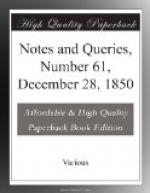W.H.C.
Parse (Vol. ii., p. 430.).—Your correspondent J.W.H. is far from correct in supposing that this word was not known in 1611, for he will find it used by Roger Ascham, in a passage quoted by Richardson in his Dictionary sub voce.
In Brinsley’s curious Ludus Literarius, 1612, reprinted 1627, 4to., the word is frequently used. At page 69. he recommends the “continual practice of parsing.” At p. 319., enumerating the contents of chap. vi., we have “The Questions of the Accidence, called the Poasing of the English Parts;” and chap. ix. is “Of Parsing and the kinds thereof, &c.”
At the end of a kind of introduction there is an “Advertisement by the Printer,” intimating that the author’s book, “The Poasing of the Accidence,” is likely to come forth. From all this, it seems as if the two words were used indifferently.
F.R.A.
The Meaning of “Version" (Vol. ii., p. 466.).—T. appears to apply a peculiar meaning of his own to the word “version,” which it would have been quite as well if he had explained in a glossarial note.
He thinks A.E.B. was mistaken in using that phrase in reference to Lord Bacon’s translation into Latin of his own English original work, and he proceeds to compare (to what end does not very clearly appear) a sentence from Lord Bacon’s English text, with the same sentence as re-translated back again from Lord Bacon’s Latin by Wats. Finally, T. concludes with this very singular remark: “Wats’ version is the more exact of the two!”
Does T. mean to call Lord Bacon’s English text a version of his Latin, by anticipation of eighteen years?
The only other authority for such meaning of the word would seem to be the facetious Dr. Prout, who accused Tom Moore of a similar version of his celebrated papers.
A.E.B.
First Paper-mill in England (Vol. ii., p. 473).—The birthplace of the “High Germaine Spilman” (Spielmann), celebrated by Churchyard, your English readers may not easily discover by his description as quoted by DR. RIMBAULT.
“Lyndoam Bodenze” is Lindau am Boden-see, on the Lake of Constance (in German, Bodensee), once a free imperial city, called, from its site on three islets in the lake, “the Swabian Venice,” now a pretty little town belonging to the kingdom of Bavaria.
V.
“Torn by Horses” (Vol. ii., p. 480.).—This cruel death was suffered by Ravaillac, who accomplished what Jean Chatel failed in doing.
The execution took place on the 27th of May, 1610, with the most atrocious severities of torture, of which the drawing by horses was but the last out of a scene that continued for many hours. The day before he had been racked to the very extremity of human suffering. The horses dragged at the wretch’s body for an hour in vain; at length a nobleman present sent one of his own, which was stronger; but this even would not suffice. The executioner had to sever the mangled body with his knife, before the limbs would give way. I could add more of these details, but the subject is intolerable.




